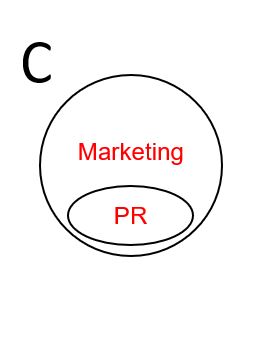PR and Marketing (3): C-Mark

In communications terms, companies operating this model prioritize marketing or consider marketing to be the natural and functionally optimal environment for PR to operate inside. In other words, PR is operated as a function of marketing.
Notionally, for the anti-silo integration it implies, this model may appear positive. Indeed, for companies whose strategy is best served by allocation of resources to marketing and/or whose need for public relations is infrequent or challenging to justify through a cost-benefits analysis, this model could be superior to any other.
Such a model may be the outcome of a company’s having subscribed to the belief that companies need to be marketing-driven. There is a case for such an argument, and there are cases of marketing initiatives yielding dramatic returns (e.g. Samsung). For companies who see few measurable benefits from PR, or whose PR is for all intents and purposes indistinguishable from marketing activity, this model is positive and intuitive.
In a marketing-driven organisation, all public-facing activities can take on the character of marketing however, so care must be taken. PR typically concerns activities that are less directly or immediately commercial than the activities of marketing (such as managing product recalls, managing crises, or publicising green initiatives, i.e. communicating CSR). For this reason, PR communications need to be scrubbed of any scent of opportunism or cynical advertising by stealth. To ensure this is achieved, a PR department may function better as an entity entirely separated from Marketing.
It is possible that PR can function effectively under the control of Marketing, but this would require dualism on the part of the Marketing Manager, who would have to disengage his/her marketing priorities when orchestrating PR activities. Likewise, if such a model required marketing people to occasionally assume PR duties, the transition might not be smooth, and the results inferior to those of in situ PR specialists awaiting activation. There is also the option of having the Marketing Manager delegate control of PR activity to a PR sub-manager. With this, of course, comes an extra layer of administrative complexity.
Ultimately, the question of whether Marketing should manage PR comes down to company ethos, costs, and strategy.
